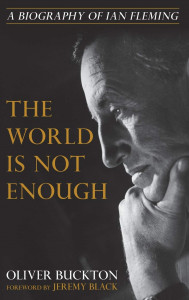 Oliver Buckton’s The World is not Enough: A Biography of Ian Fleming joins a crowded field in an effort to produce something interesting. There have been a number of past biographical pieces on Fleming, ranging from short articles to long books. The deep dive this volume takes from a point of view for biography and life, as literary influence does much to set this volume up on its own strengths.
Oliver Buckton’s The World is not Enough: A Biography of Ian Fleming joins a crowded field in an effort to produce something interesting. There have been a number of past biographical pieces on Fleming, ranging from short articles to long books. The deep dive this volume takes from a point of view for biography and life, as literary influence does much to set this volume up on its own strengths.
On occasion Buckton has chosen to write sections, particularly an introduction, in a narrative and almost novelistic style. He apologizes for this, but the interesting choice will help draw readers in and remind them of the work that Ian did which serves as his primary point of memory. In the case of the most noticeable section of such storytelling it puts before the reader several concepts which will prove later to play important roles. It also serves to be a cheeky reminder of those ways in which James Bond may have very much been something of wish-fulfillment for Fleming.
Fleming’s spy work during the Second World War is discussed, with a particular interest in how it connected him to the world of espianage and the fact he was primarily administration. While this wasn’t in the nature of James Bond style field work, the elements resembling a dispatcher or chief more than an agent. Fleming’s political views move into place, including a letter conditionally supporting appeasement he sent at one point.
An interesting note can be places to the recurring question of not only home, but Ian Fleming’s prefered places to live and visit in comparison to the life of James Bond and his interesting views and actions. Indeed the parallels and uses of nature lead Buckton to argue that James Bond was a hero with a strong environmental streak. For a character frequently associated with machismo, the military buildup, and violence, it is an unusual point of view. The naturalistic ideal is a detail which often gets overlooked in examinations of the spy stories in question, making the loom from a biographical point of view all the more useful.
The fact Ian Fleming had many love affairs received a great deal of attention, sporadically recourring throughout the book. An early romance his mother set out to destroy is given some blame for this, and it is an argument that seems to have merit. All the same the fact Ian Fleming sported complicated personal politics and his work is generally in favor of a certain level of sexual liberation seems to add to the iinteresting layers of the Bond stories.
Oliver Buckton’s The World is Not Enough represents an enjoyable and thoughtful dip into the facts of Flrming’s life, as well as his literary inspirations. It might not be the most straight forward look at the life of Ian Fleming however it is both useful and interesting. While not an exaustive resource it is nonetheless an extremely useful one, and one built for those who consider literary influence. Easy to recommend it it sounds like it appeals.
(Rowman & Littlefield 2021)
